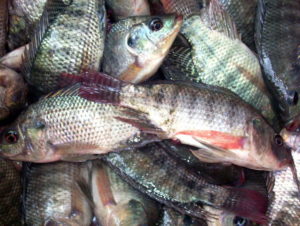[ad_1]
 The price of gutted fresh tilapia has shot up months after the flood occasioned by the spilling of excess water from the Akosombo hydro dam in the Eastern Region, the Ghana News Agency (GNA) has observed.
The price of gutted fresh tilapia has shot up months after the flood occasioned by the spilling of excess water from the Akosombo hydro dam in the Eastern Region, the Ghana News Agency (GNA) has observed.
The spillage has destroyed tilapia farms and caused hikes in pricing by value chain actors associated with the farm-to-fork of tilapia, a delicacy for many people especially during festive seasons.
At least at five popular tilapia grilled joints at Osu, North Kanashie, Nungua, Lapaz, and East Legon, in Accra, have seen about a 100 per cent increase in all the sizes.
A table size tilapia is selling at GH¢140.00, a jump from GH¢70.00 post the floods, at Osu.
Asked why the price had doubled, Daavi, a caretaker of the Osu joint, said there had been a decline in the supply side and that limited stock was expensive.
“…Now, two people buy one fish and share compared to months before where they would buy two fishes.”
Checks by the GNA indicate that farms at Asutsuare, a town along the Lake, in the Eastern Region, were selling the 50 kilogramme (kg) of medium size tilapia at GH¢2,150 for average size of tilapia.
Mr Jacob Adzikah, CEO of the Chamber of Aquaculture Ghana, said research had found that a kilogramme of tilapia which used to sell at GH¢31.00 at the farm gate had gone up to GH¢41.00 after the spillage.
The research unit of the Chamber of Aquaculture told the GNA that they had observed a slight price increase of about GH¢10.00 at the farm gate.
He projected that the trend might cause the commodity to be more expensive in the coming days.
Mr Adzikah said fish farmers along the Volta Lake lost fish stock worth about GH¢58 million due to the spillage.
He appealed to state agencies, especially the Fisheries Commission to provide some support to affected fish farmers.
None of the affected farmers, he said, had subscribed to aquaculture insurance, hence the huge loss in the industry after the flood, which displaced an estimated 35,857 residents.
“There are limited aquaculture insurance products in the sector, but many fish farms do not subscribe because they do not appreciate the importance of aquaculture insurance,” Mr Adzikah stated.
“This is a huge concern because if farms appreciate the importance of aquaculture insurance and conforming to best biological practice, it will ensure sustainability in the sector,” he added.
Some farms like China Fujian Fishing Limited are reconstructing fish cages after losing several thousands of fish stock.
Another farm Maleka Farms was seen undertaking repair works and preparing to scale up opoperation when the GNA visited.
The Environmental Protection Agency’s (EPA) Natural Resource Department (NRD) early mid- December commenced an on-site exercise to assess the impact of the recent floods on aquaculture farms at Akuse and Asutsuare.
The fact-finding mission, conducted by technical directors of other departments sought to learn about the extent of infrastructural damage, losses of livelihood, and make recommendations.
Ms Helina S. Dodd, a Principal Programme Officer at EPA-NRA, told the GNA that the visit undertaken under the instruction of the Dr Henry Kwabena Kokofu, the Executive Directors of EPA, afforded them the opportunity to interact with farm owners.
She said they held discussion with operators of fish farms and discussed avenues for technical support.
Ms Dodd stated that the team was looking into the issue of illegal fish farm operators and collaborating with other agencies to deal with the situation and ensure sanity.
She said preliminary outcome showed that many farmers had their infrastructure damaged extensively, while thousands of fishes were lost/escaped during the floods.
The Akosombo Dam, a hydroelectric dam on the Volta River that generates electricity, exceeded its water level operational capacity and had to spill excess water in October.
The spillage resulted in flooding at low-lying communities.
North and Central Tongu districts were the most hit, with communities such as Mepe, Battor, Sogakope, Mafi, Adidome and Ada inundated.
Source: GNA
[ad_2]
Source link
